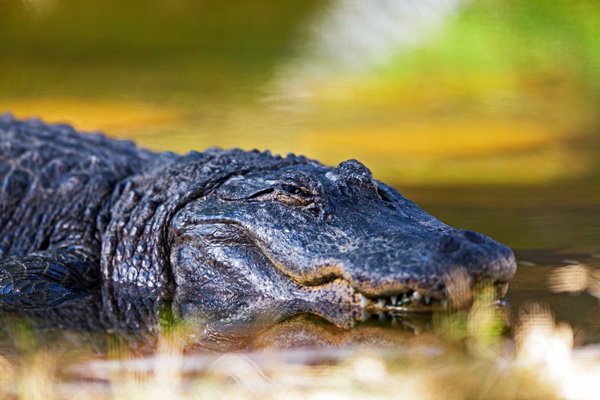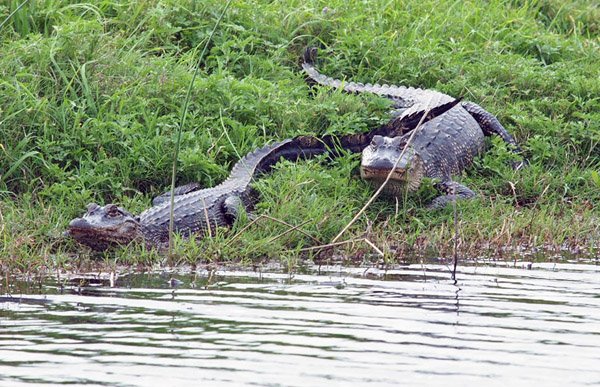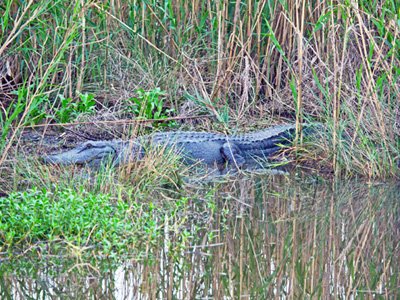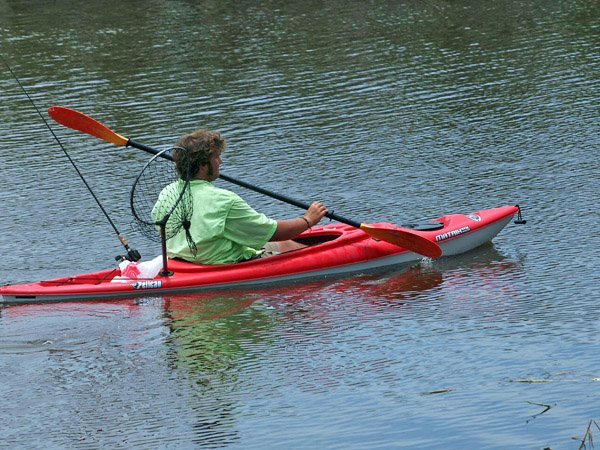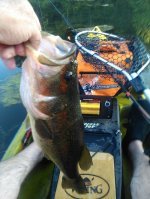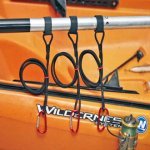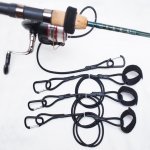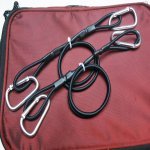~ Kayaking with Big Alligators ~
It's More Fun Than You Think
Imagine it... paddling your kayak, sitting just inches above the water and seeing big alligators looking back at you can be quite scary. It's what movies are made of. We all feel we have a little Indiana Jones in us and paddling the southern marshes and swamps can certainly be exciting. Thousands of kayakers do it every year.
However, in reality, it is nothing like the movies. In fact, it is really quite safe being on the same waters that alligators call home.
Unless you were born in the swamps and understand alligator behavior most people would not realize that big alligators generally pose little harm to kayakers.
As long as you are paddling well-traveled routes then alligators resting on the bank will probably just stay put and watch you paddle by. If they are motionless in the water, they will likely stay put. If you get too close, alligators resting on the bank will quickly slide into the water and alligators floating motionless on the water's surface will submerge. While you probably feel better if you can see them, disappearing below the surface is not an aggressive behavior. Rather, it is a "flight" mechanism to avoid any confrontation.
A Few Cautions To Get Out of the Way (Yes, You Knew There Were Some :)
- When kayaking in alligator waters, be very careful about putting your hands and feet in the water or hanging your feet off the side of the kayak when alligators are nearby.
- Don't hang fish on the side of the kayak because alligators love fish, especially fish that is easy to get. If you have fish, put them in a fish bag and store then in the kayak.
- Don't bring your small pet on-board when kayaking in alligator waters. I saw a video of a 6 ft alligator actually leaping onto the front of a kayak to grab a small dog. The dog was on a leash and jumped off the other side of the kayak. The owner reeled the dog in and got out of there and the dog was safe.
- Never feed alligators. They will get used to being fed and will swim right up to the kayak expecting and handout.
While it is true that most alligators will avoid any confrontation, there are times of the year and specific circumstances that deserve more caution. This kayaking guide will help you enjoy your time on the water and to avoid any problems with big alligators.
American Alligators VS American Crocodiles
Alligators make up 99% of the species that live in the southern states
from southern Texas to the Florida everglades and as far north as south Carolina. American crocodiles, once critically endangered, make up only 1%, mostly in Southern Florida with only one recorded attack in 2014, where the person survived. American crocodiles are shy and usually avoid human contact. Alligators do not usually
consider humans as food, but will attack if threatened, especially if they have no escape route. Alligators live
in fresh water and brackish water.
American Crocodiles live in salt
water and brackish water in southern Florida, Cuba, tropical Mexico and
the Yucatan Peninsula.
Tips and Cautions Around Big Alligators
Alligator Mating Season
You should always be careful in the spring during mating season. As soon as the weather really starts to heat up in April to May the alligators also begin to heat up.
Males become more aggressive as they seek a female. During this time big alligators can become more territorial. The larger the alligator, the greater the concern will be.
A True Story: A lady paddling an inflatable kayak in the Florida Everglades took a wrong turn towards a more secluded part of the swamp. A large alligator, at least a 10 footer, attacked the kayak biting it once and the kayak partially deflated. Unable to paddle to safety or get out of the water, the kayaker managed to get her deflated kayak over to a marshy area.
She used her cell phone to call for help and was eventually rescued. As you can imagine, until the air boat arrived she was scared to death that the alligator would make another appearance. It didn't return.
Why did the big alligator attack? Many believe the alligator was protecting his territory. Never take an inflatable kayak into the swamp and stay on well traveled routes where alligators are used to human traffic.
Always Stay Alert and Never Paddle Alone
The Alabama state record for a captured alligator is 15 ft long and weighed over 1000 lbs. The previous record was 14.2 ft and weighed over 800 lbs. It is not uncommon to see alligators over 13 ft. These monster gators can be quite intimidating, but most have a diet that doesn't include humans.
However, always be alert and do not approach alligators. If they have been used to being fed they will naturally approach, but just keep paddling and keep your distance.
Do Not Feed Alligators
Alligators, like any other animal, can
quickly get used to being fed. I have been in the swamps and watched a 13 foot alligator the locals named "Henrietta' swim over to the boat waiting to be fed.
Big alligators that are being fed lose their fear of humans. Remember, it is not normal behavior for alligators to swim on the surface towards your kayak and is generally a sign they are being fed.
If you see an alligator swimming toward you, do not stop or it may think you are waiting for him with food. Keep paddling and the alligator will realize you have nothing to offer and will turn away and disappear.
True Story: Recently a swamp tour guide lost his hand while feeding an alligator. While the tour guide was talking to his guests, the big alligator leaped from the water and grabbed the food in his hand and took his hand with it. Never feed alligators.
Watch Out for Baby Alligators
Mother alligators will usually stay with their young for two years. During that time the mother will protect the young from predators that would try to kill them. She will lunge at predators in an attempt to scare them away. Common predators of baby alligators are racoons, bears, Herons and other birds and animals. Alligator eggs are a real treat and a mother alligator has her hands full trying to protect them from predation.
It is not very common to see a mother alligator lunge at a boat in protection of her babies, but the mother will certainly be watching. Look at them and then keep on paddling.
Never Block an Alligator's Path to the Water
A big alligator will always attempt to retreat to the water when they feel threatened. If you see an alligator on the bank and want a picture, don't get too close. Any attempt to block the path to the water may result in the alligator going over the top of your kayak.
Kayak Fishing in Alligator Territory
The canals, marshes, lakes, and rivers where big alligators live are also some very productive fishing grounds. Alligators live in both fresh water and brackish marshes, called salt marshes. These marshes are a mixture of fresh and salt water.
Just how much salt can an alligator take? My uncle, who makes frequent trips to Cameron, LA on the Gulf has actually seen alligators resting on the beach directly off the Gulf of Mexico. While the Louisiana government always denied it being common, a researcher from the U.S. Fish and Wildlife Department studied it and found it is actually more common than anyone thought. It was found that alligators love to eat stingrays, lemon sharks and nurse sharks. How did he discover this? He caught and pumped the stomach of hundreds of alligators and examined the contents. Amazing. See our article on Sharks Vs Alligators.
Alligators May Steal The Fish Off Your Line
Alligators love an easy meal and many are used to watching fishermen. They have figured out that if they wait underwater a distance away from the kayak or boat until you catch a fish, they can quickly swim over and take the fish off the line. It is much easier eating hooked fish than chasing down free-swimming fish. Just be careful dipping your hand into the water to take a bass by the lip. It is better to use a net to bring the fish into the boat.
The kayak fisherman in the photo is fishing the canals and salt marshes where I have personally seen alligators larger than 10 feet. When I spoke to him he hadn't experienced any problems with big alligators.
Do Not Take Pets or Small Children on Kayaks in Alligator Country
The one sure danger is to take pets on your kayak. While this is fine in any other situation, alligators see small animals as food. There are youtube videos of alligators actually coming upon a kayak to grab a dog. The kayaker himself was not harmed nor was he the target of the alligator. The alligator was after the dog only. Save yourself some problems and leave pets at home.For more information on Louisiana and other state symbols, Please Click Here
Big Alligators back to Hammerhead Kayak Supply Home
Copyright 2015-2025 Hammerhead Kayak Supply's Legal Information Our Privacy Policy and Terms of Use |
